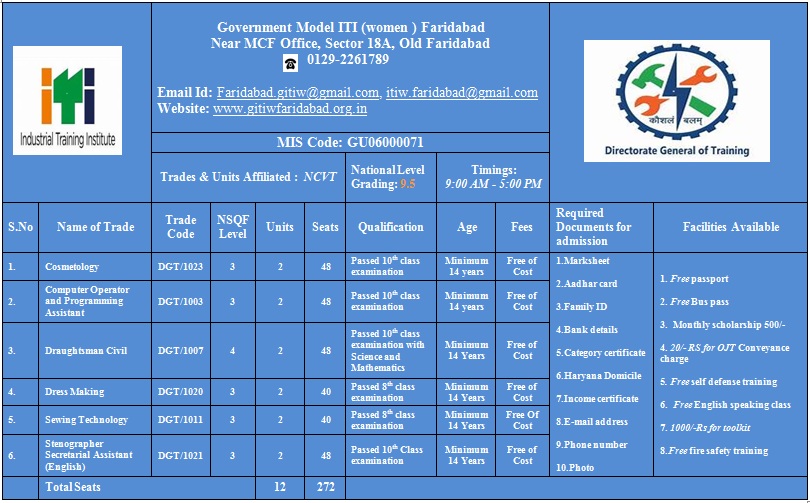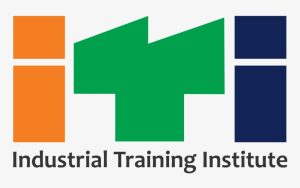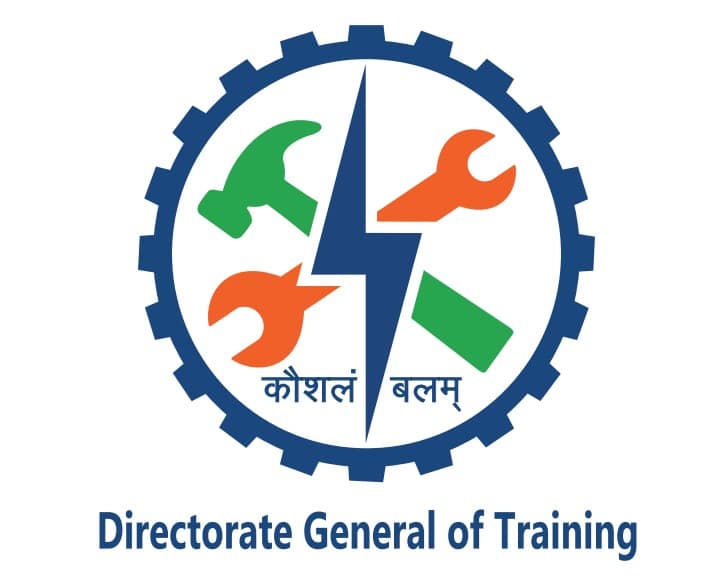Courses We Offer
- Non-Engineering Trade: Cosmetology, Computer Operator and Programming Assistant, Sewing Technology, and Dress Making
- Engineering Trade: Draughtsman Civil
- DST Trades (Dual System of Training): Sewing Technology, Dress Making

 | Government Model ITI (women ) FaridabadEmail 1d: Faridabad gitiw@gmail com, Website: www. gitiwfaridabad org. in |  |
||||||||
MIS Code: GU06000071 |
||||||||||
| trades & units affiliated : NCVT | National Level Garding: 9.5 | Timings: 9:00 AM - 5:00 PM |
||||||||
| SNo . | Name of Trade | Trade code | NSQF level | Units | Seats | Qualification | Age | Fees | required documents for admission | Facilitate Availability |
| 1 | cosmetology | DGT/1023 | 3 | 2 | 48 | Passed 10th class examination | Minimum 14 years | Free Of Cost |
|
|
| 2 | computer operator and programming assistant | DGT/1003 | 3 | 2 | 48 | Passed 10th class examination | Minimum 14 years | Free Of Cost | ||
| 3 | draughtsman civil | DGT/1007 | 4 | 2 | 48 | passed 10th class examination with science and mathematics | Minimum 14 years | Free Of Cost | ||
| 4 | dress making | DGT/1020 | 3 | 2 | 40 | Passed 8th class examination | Minimum 14 years | Free Of Cost | ||
| 5 | sewing technology | DGT/1011 | 3 | 2 | 40 | Passed 8th class examination | Minimum 14 years | Free Of Cost | ||
CTS (Craftsman Training Scheme) Overview
The Directorate General of Employment & Training (DGE&T) in the Ministry of Labor, Government of India initiated Craftsmen Training Scheme (CTS) in the year 1950 to ensure a steady flow of skilled workers in different trades for the domestic industry by establishing about 50 Industrial Training Institutes (ITIs). The objective was to raise industrial production quantitatively & qualitatively through systematic training, to reduce unemployment among the educated youth by providing them with employable training, and to cultivate & nurture a technical and industrial attitude in the minds of the younger generation. The scheme, the most important in the field of vocational training, has been shaping craftsmen to meet the existing as well as future manpower need, through the network of Government & Private Industrial Training Institutes (ITIs) in the country. The day-to-day administration of Industrial Training Institutes (ITIs) under the Craftsmen Training Scheme (CTS) was transferred to the state governments/Union Territory (UT) administration in the year 1956. The financial control of Industrial Training Institutes (ITIs) in the state, as well as Union Territories (UTs), has been transferred to the respective state governments/ Union Territories (UTs) administration from April 1969.
Under the constitution of India, Vocational training is the concurrent subject of both Central and State Governments. The development of training schemes at the National level, the evolution of policy, laying of training standards, and norms, conducting of examinations, certification, etc. are the responsibilities of the Central Government, whereas the implementation of the training schemes largely rests with the State Governments/Union Territory (UT) Administrators. The Central Government is advised by the National Council of Vocational Training (NCVT), a tripartite body having representatives from employers, workers, and Central/State Governments. Similar Councils termed State Councils for Vocational Training are constituted for the same purpose by the respective State Governments at state levels. Since April 2015, the Craftsmen Training Scheme (CTS) scheme has been transferred from The Directorate General of Employment & Training (DGE&T), Ministry of Labour & Employment, GoI. To the Directorate General of Training (DGT), Ministry of Skill Development & Entrepreneurship, Government of India.
